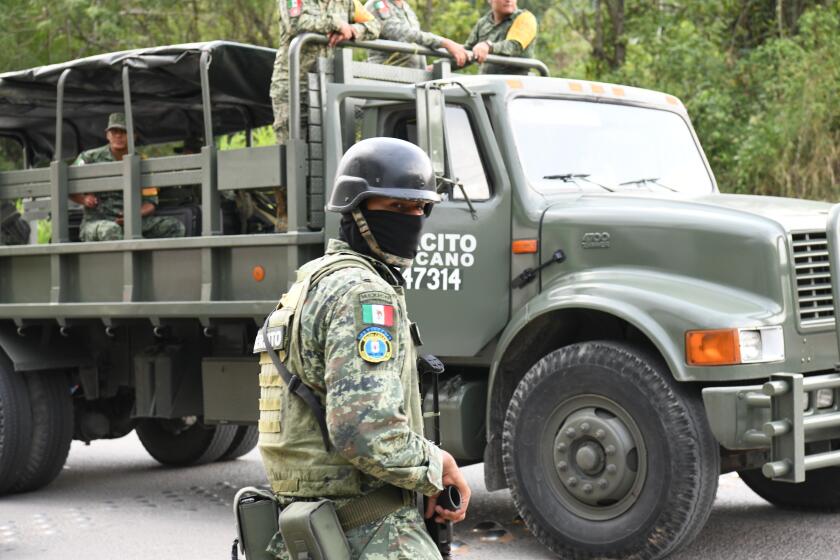U.S. Communists’ big red archives
Crammed with Lenin buttons, dusty memos from the McCarthy period, and crumbling pages of internal briefings dating back a century, the 2,000 cardboard boxes handed over to New York University last month hold secrets about the Communist Party USA that make archivist Peter Filardo’s heart flutter.
Decades ago, they would have been gold mines for the FBI.
“Oh yeah, this is it,” Filardo said, sifting through one box. “National convention material from 1919 -- this is the founding convention of the Communist Party. Handwritten notes, let’s see.”
He pulled out a 1927 typewritten document bearing the words “READ AND DESTROY” in faded black ink. The memo was written by William Z. Foster. “He was probably the most prominent U.S. Communist,” Filardo said. “This is a valuable document.”
Last year, Filardo received a phone call from the Communist Party’s national chairman, Sam Webb, who told him the organization wanted to donate its entire archival collection to the Tamiment Library at NYU. The party planned to renovate its headquarters, Webb said, and it no longer had room for the cache, which took up several floors.
Filardo’s pulse raced at the notion of rummaging through the attic of American communism. An archivist for 28 years, his passion is progressive American history. What a thrill it would be, he thought, to examine membership lists, read confidential letters intended for party leaders, sort through the Daily Worker newspaper morgue. What debate, he wondered, would the archives spark about communism’s links to women’s suffrage and the civil rights movement?
Filardo contacted the library director, Michael Nash. This call, he told him, was important. The NYU library is one of the nation’s premier research centers for the history of the American left. The proposal seemed fit for marriage, and Nash agreed.
A few months later, wearing masks to keep from inhaling dust, Filardo, Nash and a team of workers spent weeks packing the material from inside the Communist Party’s national headquarters on West 23rd Street in Manhattan. Most of it ended up in storage in an old video shop, the contents waiting to be carefully cataloged. The process could take as long as five years.
An exhibit of some of the contents has been started at the library.
“It’s an incredibly rich trove of documents,” Nash said. “Most have never been seen before. It’s virgin territory.”
Box by box, the sorting began. Filardo and his crew came across revealing artifacts: instructions of theoretical perspectives that communists should follow, written by Nikolai Bukharin, a leader of the Russian Revolution; party members’ secret pseudonyms like Cook, Wheat, Ward, Rafael; buttons with slogans like “I won’t live with Jim Crow,” and “Free Angela Davis”; bios and files full of clippings about thousands of members.
As word spread about NYU’s archival windfall, Filardo began fielding daily phone calls from historians wanting information on the McCarthy period, espionage, African American communists. Genealogists called asking for people who may have popped up in party files or on rosters. Veteran Communist Party members called, curious about whether their names had appeared.
For Filardo, 56, who wears wrinkled button-down shirts and quotes Leo Tolstoy and Alexander Pushkin in everyday conversation, the relics are a way to understand an era he has been fascinated by since childhood.
Taped to his office walls are photographs of Sally Belfrage, an activist and journalist who covered the civil rights movement. His mind is a database of historical facts about people such as Charles Ruthenberg, a founder of the American Communist Party; Robert Minor, a famous cartoonist who joined the movement; and James W. Ford, the first African American to run for U.S. vice president in the 20th century, appearing on the Communist ticket in 1932. The boxes hold hints of all of their lives.
“What we now see as the mainstream usually begins on the left, if you look on historical terms,” Filardo said. “It’s inspiring to see stories of people who make their own history and become actors on a historical stage instead of just being acted upon.”
Filardo can narrate the history of the Communist Party USA as if he lived through all of it. The party strengthened in the 1920s and 1930s, he said, as people began to question the government, especially during the Great Depression. It became influential in the U.S. labor movement, and its members also worked on issues such as African American rights, women’s rights and other movements -- despite strong government efforts to curb its work.
When the Cold War began, he said, the party’s association with the Soviet Union was looked at more negatively. It became “an albatross around their neck,” Filardo said. Labor union leaders associated with communism were marginalized. When the Soviet Union broke apart, he said, the American Communist Party split too. It still exists, though less prominently, with chapters around the country and its headquarters in New York.
At the NYU library, Filardo lifted the top of a glass case to get a closer look at one the gems discovered in the archives so far: A pencil-written verse of what became a famous labor anthem, “My Will is easy to decide/For there is nothing to divide.”
It was written by Joe Hill, a songwriter and labor organizer, jailed for a murder some believed he did not commit. Next to it sits a scrapbook made by Elizabeth Gurley Flynn, a women’s rights activist and a founder of the American Civil Liberties Union. It was dedicated to Hill, covered with newspaper clippings about him and the words: “Make the next few days count in the struggle to save Joe Hill’s life.”
Efforts to free him didn’t work. Hill was executed by a firing squad in Utah in 1915. The faded poetry of his will was written while he was in jail, not long before his death.
“This was the original,” Filardo said, delicately touching the yellowed paper that is part of the library exhibit. Before delving into the archives, “I didn’t even know the original existed,” he said.
Filardo wonders what other treasures he will unearth over the next few years.
The Communist Party “didn’t tell the world that they had all this history there,” he said. “It’s very exciting.”
More to Read
Sign up for Essential California
The most important California stories and recommendations in your inbox every morning.
You may occasionally receive promotional content from the Los Angeles Times.









